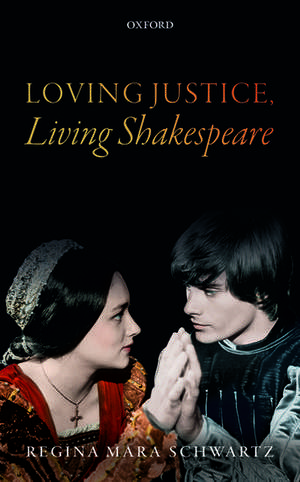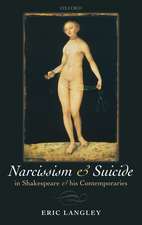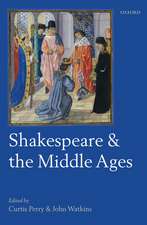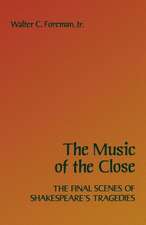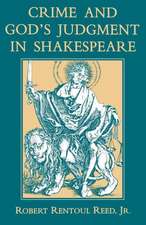Loving Justice, Living Shakespeare
Autor Regina Mara Schwartzen Limba Engleză Hardback – 17 noi 2016
Preț: 234.11 lei
Nou
Puncte Express: 351
Preț estimativ în valută:
44.80€ • 46.90$ • 37.07£
44.80€ • 46.90$ • 37.07£
Carte tipărită la comandă
Livrare economică 25-31 martie
Preluare comenzi: 021 569.72.76
Specificații
ISBN-13: 9780198795216
ISBN-10: 0198795211
Pagini: 154
Dimensiuni: 148 x 224 x 15 mm
Greutate: 0.31 kg
Editura: OUP OXFORD
Colecția OUP Oxford
Locul publicării:Oxford, United Kingdom
ISBN-10: 0198795211
Pagini: 154
Dimensiuni: 148 x 224 x 15 mm
Greutate: 0.31 kg
Editura: OUP OXFORD
Colecția OUP Oxford
Locul publicării:Oxford, United Kingdom
Recenzii
Loving Justice, Living Shakespeare is an important study whose humane learning and graceful interpretations help it strive for and attain, in the difficult moments in life and literature, a rare wisdom in Shakespeare studies: the wisdom of love.
The final chapter of the book, which is on 'The Forgiveness of Love', concludes with an insightful analysis of Hamlet as an 'anti-revenge tragedy', where retribution happens circumstantially' if at all (p. 104) and does not in any way equate to justice. It is 'rebuke' that acts as its far more effective substitute, a third way between revenging and forgetting the crime.
Loving Justice, Living Shakespeare ignites an overdue conversation between Shakespeare and lawa subfield within early modern studiesand ethics, jurisprudence, and biblical scholarship.
extremely illuminating
Loving Justice, Living Shakespeare is a refreshingly compelling book. By performing the terms of its title, it offers us the opportunity to reflect deeply on urgent matters. Regina Schwartz loves justice and lives Shakespeare, and by expressing this in the form of a brilliant and unconventional monograph she helps us see that there is no justice without love; and that Shakespeare, in living among us in and through his work, is a trustworthy companion with whom to explore vital questions. What is love? What is justice? What is life? What is the relationship between them? In short: what does it mean to be human?
Loving Justice, Living Shakespeare is a critique of modern liberal ways of thinking about persons and society and a critique of present-day Western society as shaped by those liberal ways of thinking. The critique is incisive and powerful.
This exceptional book deserves to be read not only by students and scholars of Shakespeare, but by students and scholars of religion, Western philosophy, and legal thought. Loving Justice, Living Shakespeare deserves to be read widely because it offers an acute and timely critical perspective on the economic understanding of human justice in our world today.
Overall, this book belongs to the growing criticism on Shakespeare and philosophy. The force of Schwartz's writing lies in disentangling - clearly, simply (but not simplistically), and persuasively - - the intricately layered concepts of love, as a discourse and experience, and justice, as a counter-discourse and demand. She uses a critical language that makes this book valuable to specialists and a general readership in search of reliable, expert, and beautiful critical judgment on two important notions between which the lives of characters in Shakespeare's plays unfold.
Fascinating.
New books on Shakespeare which open the mind and the imagination are rarities. Still more are those which ally this to a challenge to contemporary thinking. Loving Justice is one of them.
In this sensitive and deeply humane study, Regina Schwartz writes lovingly about love, and justly about justice. She uses insights of the biblical tradition and Shakespeare's great plays to shed a much needed new light on the often abstract and sterile nature of contemporary writings about love and justice. Her book opens our eyes to the potential, the power and the richness of love in our personal and social relations. This is the book we have been waiting for.
Regina Schwartz's elegant study in Loving Justice, Living Shakespeare undertakes to see the world justly through Shakespeare's eyes. By justice she means much more than simply paying a debt, or fairly distributing goods or opportunities. To live under the regime of love is to inhabit a landscape where humans do not undervalue the worth or rights of others.
The final chapter of the book, which is on 'The Forgiveness of Love', concludes with an insightful analysis of Hamlet as an 'anti-revenge tragedy', where retribution happens circumstantially' if at all (p. 104) and does not in any way equate to justice. It is 'rebuke' that acts as its far more effective substitute, a third way between revenging and forgetting the crime.
Loving Justice, Living Shakespeare ignites an overdue conversation between Shakespeare and lawa subfield within early modern studiesand ethics, jurisprudence, and biblical scholarship.
extremely illuminating
Loving Justice, Living Shakespeare is a refreshingly compelling book. By performing the terms of its title, it offers us the opportunity to reflect deeply on urgent matters. Regina Schwartz loves justice and lives Shakespeare, and by expressing this in the form of a brilliant and unconventional monograph she helps us see that there is no justice without love; and that Shakespeare, in living among us in and through his work, is a trustworthy companion with whom to explore vital questions. What is love? What is justice? What is life? What is the relationship between them? In short: what does it mean to be human?
Loving Justice, Living Shakespeare is a critique of modern liberal ways of thinking about persons and society and a critique of present-day Western society as shaped by those liberal ways of thinking. The critique is incisive and powerful.
This exceptional book deserves to be read not only by students and scholars of Shakespeare, but by students and scholars of religion, Western philosophy, and legal thought. Loving Justice, Living Shakespeare deserves to be read widely because it offers an acute and timely critical perspective on the economic understanding of human justice in our world today.
Overall, this book belongs to the growing criticism on Shakespeare and philosophy. The force of Schwartz's writing lies in disentangling - clearly, simply (but not simplistically), and persuasively - - the intricately layered concepts of love, as a discourse and experience, and justice, as a counter-discourse and demand. She uses a critical language that makes this book valuable to specialists and a general readership in search of reliable, expert, and beautiful critical judgment on two important notions between which the lives of characters in Shakespeare's plays unfold.
Fascinating.
New books on Shakespeare which open the mind and the imagination are rarities. Still more are those which ally this to a challenge to contemporary thinking. Loving Justice is one of them.
In this sensitive and deeply humane study, Regina Schwartz writes lovingly about love, and justly about justice. She uses insights of the biblical tradition and Shakespeare's great plays to shed a much needed new light on the often abstract and sterile nature of contemporary writings about love and justice. Her book opens our eyes to the potential, the power and the richness of love in our personal and social relations. This is the book we have been waiting for.
Regina Schwartz's elegant study in Loving Justice, Living Shakespeare undertakes to see the world justly through Shakespeare's eyes. By justice she means much more than simply paying a debt, or fairly distributing goods or opportunities. To live under the regime of love is to inhabit a landscape where humans do not undervalue the worth or rights of others.
Notă biografică
Professor Regina Schwartz teaches literature, religious studies and law at Northwestern University. She has authored Remembering and Repeating: On Milton's Theology and Poetics (Cambridge, winner of the James Holly Hanford's Book Award). She co-edited Desire in the Renaissance, on English and Italian literature (Princeton). Her The Curse of Cain: The Violent Legacy of Monotheism, calls attention to the cultural uses of scripture to endorse violence (Chicago, nominated for the Pulitzer Prize). She also edited Transcendence: Philosophy, Literature and Theology Approach the Beyond (Routledge), The Book and the Text, The Bible and Literary Theory (Blackwell) and co-edited The Postmodern Bible (Yale). Her last book, When God Left the World: Sacramentality at the Dawn of Secularism explores the sacramental vision of justice that infuses the poetry, drama, and the wider culture of the English Reformation.
